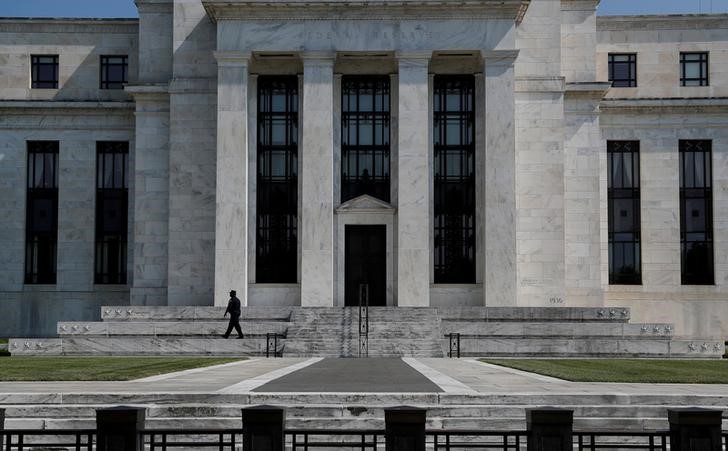By Jennifer Ablan
(Reuters) - Even if the Federal Reserve this week goes ahead and cuts benchmark interest rates for the first time in more than a decade - as it is widely expected to do - U.S. money market strains will remain, Bill Campbell, co-portfolio manager of the DoubleLine Global Bond Fund, said on Tuesday.
"Ultimately, increased federal deficits and expanded Treasury issuance to fund those deficits, combined with a reversal in investor appetite for that growing supply of Treasuries, will bring pressures back into money markets," Campbell said. "These markets are already taut due to the quantitative tightening (QT) done so far and increased regulation since the global financial crisis."
Currently, the U.S. central bank rolls off billions of dollars of maturing bonds from its balance sheet each month without reinvesting the proceeds. That balance-sheet reduction - known as quantitative tightening - has, since October 2017, reduced what had been $4.25 trillion of bond holdings that the Fed accumulated between 2008 and 2014, to around $3.62 trillion now. The bond reduction is currently set to end in September.
Money markets serve as a key part of the Federal Reserve "monetary transmission mechanism," starting with the effective, or average, federal funds rate, Campbell noted in a research report titled "Quantitative Tightening Risks Decoupling Money Markets from Fed Funds Rate."
"In normal conditions, the fed funds rate would exert a kind of benign domino effect on rates throughout the broader money markets and ultimately into the capital markets."
However, to the extent that QT heightens volatility in the money markets, QT counteracts the "downstream effect" of the fed funds rate on rates in other money markets, he said.
Complicating matters, Campbell said, is an upcoming change to the one short-rate benchmark, which underlies almost every floating-rate fixed-income instrument employed today, including adjustable-rate mortgages.
The London Interbank Offer Rate (LIBOR), the interest rate currently used for all floating-rate securities, is due to be replaced by the Secured Overnight Financing Rate (SOFR). The LIBOR rate is calculated by a bank survey, which has been criticized as failing to reflect true market rates as it rarely exhibits large spikes. In contrast, SOFR represents a weighted average of several different money-market rates.
"Those markets have been exhibiting large spikes," Campbell said. "Thus, the shift from LIBOR to SOFR will compound the increased volatility in the money markets already resulting from QT."
